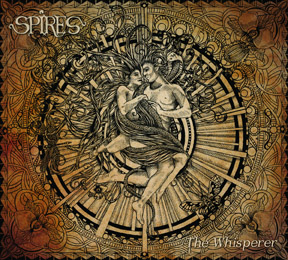
Spires were formed in 2008 in Manchester, U.K., by guitarist / vocalist and producer Paul Sadler. Shortly after, with a fix line-up (including Paul Cuthbert), Spires recorded a first album, Spiral Of Ascension, which was reviewed very positively by the international press. Our own colleague Tony wrote a very honourable review, which you can still read on Concreteweb (see update February 8th 2011, Archive-tab). In 2012 the band returned with the Lucid Abstractions-EP, which unfortunately didn’t reach the Concreteweb’s headquarters. Especially in their home country, by the way, Spires gained a highly appreciated live status too.
Earlier this year, long-time friend and colleague Paul C. left the band in order to concentrate on his family. Spires soon found a replacement, by means of Richard Corrie of Thirty Aethyrs-fame, and the quartet (besides Paul S. and Richard, Spires still consists of Alex Jolley and Chris Barnard) started recording the second full length. Once again the production, engineering and mix were done by Paul Sadler himself, and after having finished the new material, Spires were able to sign to the roster of Eulogy Media, a smaller label from the United Kingdom that also houses (more or less comparable acts like) Talanas and Rannoch, as well as Agonyst, DAM and Beth Ryan.
The Whisperer has a total running time of sixty six minutes, once again meaning that the average duration of the songs, seven pieces in totality, is pretty lengthy… The longest one, which is the title track, even clocks over twenty minutes.
I hadn’t heard the debut, but I did read the review Tony did for that album very carefully. Being open-minded, Progressive in a very general sense, comparisons to the likes of Opeth, Emperor, Mastodon and Cynic… There’s quite a lot of attraction once again, it seems. So, what about this sophomore album, The Whisperer? Actually, it starts with Ethereal Organisms (I like that title) (fourteen minutes of length), which opens with (electric?) cello, acoustic guitars and viola, soon joined by electric guitars, and then, slowly, turning into a monster of a Metal hymn. And indeed, this is the kind of material that succeeds narrow-minded limitations of putting a scene-label on; this trespasses mediocrity.
Vocally there is quite some variation (instrumentally too, of course, but I come back to that later). Most vocals are rather typifying when talking about ‘Progressive Metal’: clean and melodic, little high and emotional probably, sometimes rather crooning or mournful. Besides, there are quite some grunts and screams, and especially within the harsher parts, it isn’t impossible to refer to the Black and Death Metal scenes, evidently. When it comes to the ‘instruments’ (and then I am pointing at everything except for the vocals), well, there is quite some differentiation too. Besides the ‘usual’ instruments, i.e. electric and acoustic guitars, drums and bass, Spires make use of violins and cello (as mentioned), as well as keyboards (evidently). With Elsewhere, spires even have a classical piece, totally acoustic, and injected with elements from Folk / Neo-Folk (cf. the acoustic guitar melodies) and Classical / Orchestral (cf. the dual-vocally choirs and orchestral instruments).
Seen from compositional point of view (cf. the structural approach), variation once again is the keyword. Throughout the whole journey, there is the little experimental moniker of ‘Progressive’ that sort of carries the whole package. That gets translated through the several avant-garde and / or modernistic structures especially. Listen to some specific guitar leads, the prominent bass lines, or the crafted drum patterns… Sometimes the stuff accelerates, or turns pretty brutal and harsh, then again everything slows down, adding integrity and soberness. In general, the whole is very complex, yet not too much exaggerated, with a unique cohesion throughout the whole trip. And despite the overwhelming energy and the multi-layered structures, the whole album is not that difficult to digest (I have an inborn allergy to overacted proggy nonsense), because actually, it all makes sense.
Cynic / Death, Opeth, Dream Theatre, Vintersorg, Devin Townsend, Ephel Duath and the likes might be closely related combos (seen from sonic point of view, of course), so…
